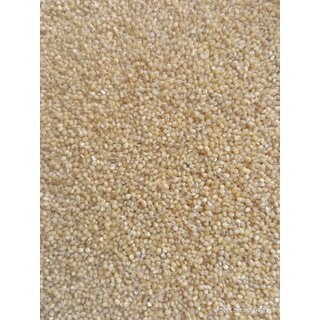
Uzhavan Unavu - UnPolished Foxtail Millet Thenai Rice - 500Gms.
Quick Overview
Health Benefits of Foxtail Millet:
Stronger Bones:
Foxtail millets are an excellent source of iron and calcium which play a pivotal role in maintaining the health of bones and muscles. Iron deficiency can cause various health conditions including weaker muscles, anemia, frequent muscle spasms. Include Foxtail millet in your regular diet to meet the calcium and phosphorous needs of the body for combating brittle bones, inflammation and other bone related chronic conditions like osteoporosis, arthritis, spondylitis etc.
Strengthens Nervous System:
Nutritionists strongly recommend the intake the Foxtail millet for keeping various neurological disorders at a bay. Loaded with Vitamin B1, this tiny gluten-free cereal gives your 0.59 mg of it, in every cooked 100 grams. Eating this nutritious cereal not only slows down the progression of various neurodegenerative conditions like Alzheimer’s, Parkinson’s etc but makes a positive impact on the nervous system. The high amount of iron triggers cognitive function by providing more oxygenation to the brain.
Boosts Cardiac Health:
Millets are in general popular for maintaining good heart health. Being gluten-free, rich in protein and less on carbs these amazing wonders of nature aid in the formation of neurotransmitter acetylcholine that transfers message between muscle and nerves besides protecting the heart functions. Eat it daily to protect heart from various ailments.
Manages Diabetes:
Diabetic patients are generally discouraged to cut down on the intake of rice, owing to its high carb content. Foxtail millet is an absolutely great substitute to rice as it keeps you satiated for longer hours. The trick is to eat thoroughly cooked Foxtail millet in the place of rice for preventing those mid-day hunger pangs and avoid sudden spike in sugar levels. The glycemic index of Foxtail millet is at 50.8 making it an ultimate choice of low-glycemic foods. Include it in daily diet to witness a healthy dip in levels of blood sugars, glycosylated hemoglobin and lipid profile.
Lowers Bad Cholesterol:
Foxtail millet contains a good source of amino acids including Lecithin and Methionine which play a crucial level in decreasing cholesterol by reducing excess fat in the liver. The presence of Threonine prevents fatty liver, further decreasing the levels of bad cholesterol.
Triggers Weight Loss:
Tryptophan, an amino acid present in Foxtail millet in ample amounts is crucial for preventing hunger pangs. If you are one of those battling excessive fat around the belly, it’s time to increase the intake of Foxtail millet as it prevents accumulation of fatty substances in the body.
Promotes Digestion:
Happy gut is an indication of overall health. Digestive issues if not addressed early can turn chronic and may lead to severe constipation, diarrhea or irritable bowel syndrome. It is an amazing choice of food for those with gluten intolerance or celiac disease. Eat it with loads of vegetables to regulate bowel movements and to lose weight.
Builds Immunity:
In these days and times of pandemic, nothing is more important than a robust immunity. A rich source of vitamins, minerals and other nutrients, Foxtail millet ups the stamina, keeps you stronger and builds immunity for fighting various infections lurking around. If you have fallen ill recently to any of the viral or bacterial infections, include it in daily diet for gaining the strength back.
The foxtail millet contained 30.10 mg/100 g calcium and 3.73 mg/100 g iron whereas barnyard millet contained 23.16 mg/100 g calcium and 6.91 mg/100 g iron. Values of 10 mg/100 g calcium and 0.10 mg/100 g iron were observed for ric
